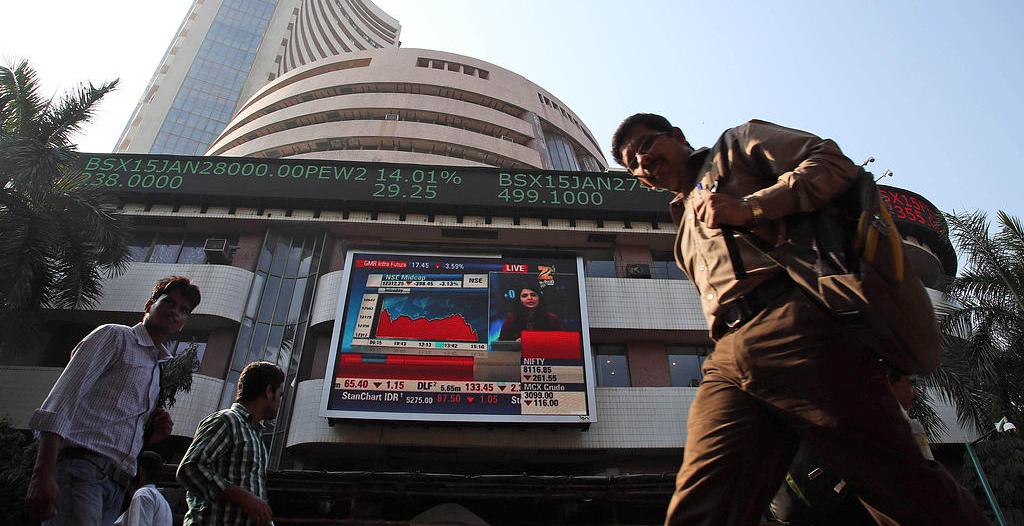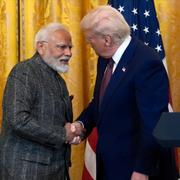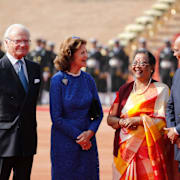
Forskare: Indien tar över som största tillväxtland
Indien har gått om Kina som världens snabbast växande större ekonomi. Och landet kommer att behålla ledningen fram till 2025, enligt en rapport från Hardvarduniversitetet, skriver Livemint. Den genomsnittliga BNP-tillväxten under de närmaste åtta åren beräknas till 7,7 procent.
Bakgrunden till Indiens framgångar är att man lyckats bredda ekonomin. Till skillnad från länder som är beroende av en enda exportvara såsom olja har Indien utvecklat sektorer som kemikalier, fordon och viss elektronik, enligt rapporten.
bakgrund
Indiens ekonomi
Wikipedia (en)
The economy of India is the seventh-largest in the world measured by nominal GDP and the third-largest by purchasing power parity (PPP). The country is classified as a newly industrialised country, and one of the G-20 major economies, with an average growth rate of approximately 7% over the last two decades. Maharashtra is the wealthiest Indian state with an annual nominal GDP of US$330 billion, roughly equivalent to those of Venezuela and the United Arab Emirates, and accounts for 13.4% of India's GDP, followed by the states of Tamil Nadu (US$170 billion) and Uttar Pradesh (US$150 billion). India's economy became the world's fastest growing major economy in the last quarter of 2014, surpassing the People's Republic of China.
The long-term growth prospective of the Indian economy is positive due to its young population, corresponding low dependency ratio, healthy savings and investment rates, and increasing integration into the global economy. The Indian economy has the potential to become the world's 3rd-largest economy by the next decade, and one of the two largest economies by mid-century. The International Monetary Fund (IMF) described the Indian economy as the "bright spot" in the global landscape. India topped the World Bank's growth outlook for the first time in fiscal year 2015–16, during which the economy grew 7.6%. Growth is expected to have declined slightly to 7.1% for the 2016–17 fiscal year. According to the IMF, India's growth is expected to rebound to 7.2% in the 2017–18 fiscal and 7.7% in 2018–19.
India has one of the fastest growing service sectors in the world with an annual growth rate above 9% since 2001, which contributed to 57% of GDP in 2012–13. India has become a major exporter of IT services, Business Process Outsourcing (BPO) services, and software services with $167.0 billion worth of service exports in 2013–14. This is the fastest-growing part of the economy. The IT industry continues to be the largest private-sector employer in India. India is the third-largest start-up hub in the world with over 3,100 technology start-ups in 2014–15 The agricultural sector is the largest employer in India's economy but contributes to a declining share of its GDP (17% in 2013–14). India ranks second worldwide in farm output. The industry sector has held a steady share of its economic contribution (26% of GDP in 2013–14). The Indian automobile industry is one of the largest in the world with an annual production of 21.48 million vehicles (mostly two and three wheelers) in 2013–14. India had $600 billion worth of retail market in 2015 and one of world's fastest growing e-commerce markets.
India's two largest stock exchanges, Bombay Stock Exchange and National Stock Exchange of India, had a market capitalisation of US$1.71 trillion and US$1.68 trillion as of February 2015, which rank 11th and 12th in the world according to the World Federation of Exchanges. India is also home to the world's third-largest billionaires pool with 111 billionaires in 2016 and the fourth-largest number of ultra-high-net-worth households that have more than US$100 million.
India is a member of the Commonwealth of Nations, the South Asian Association for Regional Cooperation, BIMSTEC, the Non Aligned Movement, the G20, the G8+5, the International Monetary Fund, the World Bank, the World Trade Organisation, the United Nations, the BRICS, the Shanghai Cooperation Organisation, the Asian Infrastructure Investment Bank and Missile Technology Control Regime.
Omni är politiskt obundna och oberoende. Vi strävar efter att ge fler perspektiv på nyheterna. Har du frågor eller synpunkter kring vår rapportering? Kontakta redaktionen



